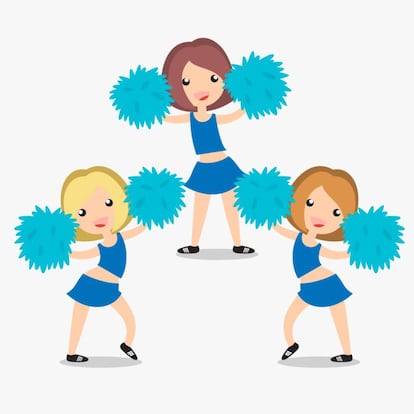How the “cheerleader effect” can make you appear more attractive
According to the theory, people are better looking when in a group than when they are alone

Picture a group of good-looking people. They could be cheerleaders, the members of a boy band or young people on a night out. Now, let me ask you something: are all of them attractive or is it just a trick of the mind?
In 2014, academics Drew Walker and Edward Vul published an article in which they came to a startling conclusion: people appear more attractive when they are in a group than as individuals.
They dubbed the phenomenon the “cheerleader effect,” but it applies equally to men as it does to women. Interestingly, it all comes down to a problem with our perception.
Psychologists found that on first glance, our minds unconsciously measure beauty based on the average
In a series of studies, Walker and Vul, both psychologists from the University of California, San Diego, showed 100 photos of individual faces and later the same face surrounded by others. Participants were then asked to rate how attractive each face was. Surprisingly, faces were given a higher score when they appeared in the collage. But why?
The psychologists found that on first glance, our minds unconsciously measure beauty based on the average. This average score tends to be higher than the individual. In other words, the average beauty score of a cheerleader team is higher than all the individual scores added together. If we accept that our perception is faulty, what can we do to take advantage of this trick of the mind?
In their paper, published in Psychological Journal, the researchers suggest: “If you’re on a date it’s a good idea to go with friends, especially if you physically compliment one another and average out the imperfections.” Surrounding yourself with people who compliment you physically will help you look more attractive. This happens irrespective of whether you are with men or women.
So, if you want to appear better looking try not to appear by yourself in photos. Instead surround yourself with others who will help complement your defects. Appearing more attractive also makes you appear more intelligent. Other studies have found that we unconsciously link beauty to intelligence due to the so-called “halo effect.”
Other studies have found that we unconsciously link beauty to intelligence due to the “halo effect”
Lastly, try to be more aware of the cheerleader effect. Remember, the phenomena does not just apply to men and women, it also applies to products – the findings of Walker and Vul are well known in the marketing industry. That’s why photos of products are often placed in a dazzling smorgasbord of offers. Given we unconsciously measure the average – and not the individual – we should be careful not to be fooled by things such as IKEA’s elaborate home displays. As a whole we may like it but if we look at the objects one by one, we may have a different opinion. If we are going to buy furniture or anything else, judge products on their own merits and with a level of detachment. That way you can avoid falling for the “cheerleader effect.”
English version by Melissa Kitson.
Tu suscripción se está usando en otro dispositivo
¿Quieres añadir otro usuario a tu suscripción?
Si continúas leyendo en este dispositivo, no se podrá leer en el otro.
FlechaTu suscripción se está usando en otro dispositivo y solo puedes acceder a EL PAÍS desde un dispositivo a la vez.
Si quieres compartir tu cuenta, cambia tu suscripción a la modalidad Premium, así podrás añadir otro usuario. Cada uno accederá con su propia cuenta de email, lo que os permitirá personalizar vuestra experiencia en EL PAÍS.
¿Tienes una suscripción de empresa? Accede aquí para contratar más cuentas.
En el caso de no saber quién está usando tu cuenta, te recomendamos cambiar tu contraseña aquí.
Si decides continuar compartiendo tu cuenta, este mensaje se mostrará en tu dispositivo y en el de la otra persona que está usando tu cuenta de forma indefinida, afectando a tu experiencia de lectura. Puedes consultar aquí los términos y condiciones de la suscripción digital.








































